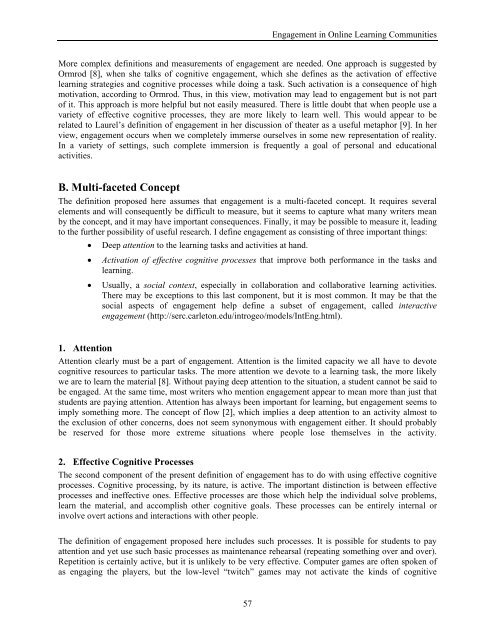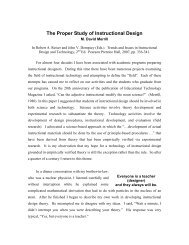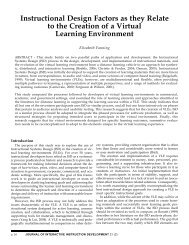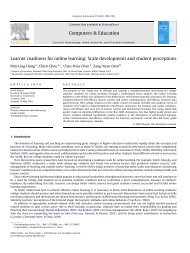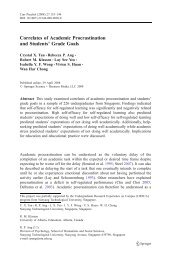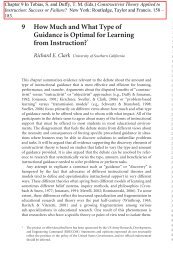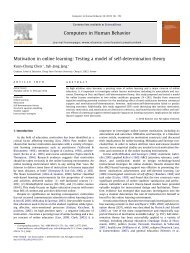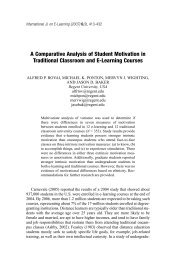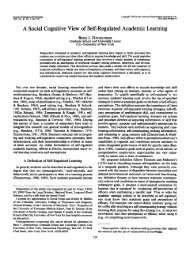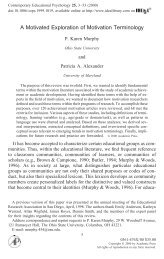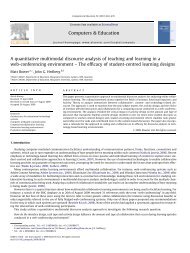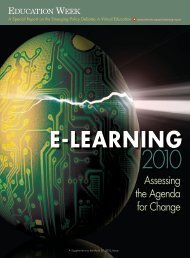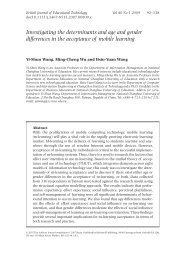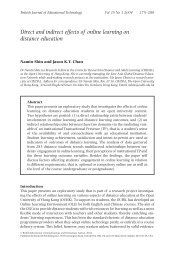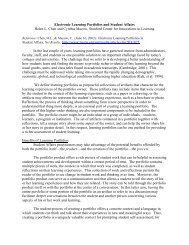Elements of Quality Online Education cation
Elements of Quality Online Education cation
Elements of Quality Online Education cation
You also want an ePaper? Increase the reach of your titles
YUMPU automatically turns print PDFs into web optimized ePapers that Google loves.
Engagement in <strong>Online</strong> Learning CommunitiesMore complex definitions and measurements <strong>of</strong> engagement are needed. One approach is suggested byOrmrod [8], when she talks <strong>of</strong> cognitive engagement, which she defines as the activation <strong>of</strong> effectivelearning strategies and cognitive processes while doing a task. Such activation is a consequence <strong>of</strong> highmotivation, according to Ormrod. Thus, in this view, motivation may lead to engagement but is not part<strong>of</strong> it. This approach is more helpful but not easily measured. There is little doubt that when people use avariety <strong>of</strong> effective cognitive processes, they are more likely to learn well. This would appear to berelated to Laurel’s definition <strong>of</strong> engagement in her discussion <strong>of</strong> theater as a useful metaphor [9]. In herview, engagement occurs when we completely immerse ourselves in some new representation <strong>of</strong> reality.In a variety <strong>of</strong> settings, such complete immersion is frequently a goal <strong>of</strong> personal and edu<strong>cation</strong>alactivities.B. Multi-faceted ConceptThe definition proposed here assumes that engagement is a multi-faceted concept. It requires severalelements and will consequently be difficult to measure, but it seems to capture what many writers meanby the concept, and it may have important consequences. Finally, it may be possible to measure it, leadingto the further possibility <strong>of</strong> useful research. I define engagement as consisting <strong>of</strong> three important things:• Deep attention to the learning tasks and activities at hand.• Activation <strong>of</strong> effective cognitive processes that improve both performance in the tasks andlearning.• Usually, a social context, especially in collaboration and collaborative learning activities.There may be exceptions to this last component, but it is most common. It may be that thesocial aspects <strong>of</strong> engagement help define a subset <strong>of</strong> engagement, called interactiveengagement (http://serc.carleton.edu/introgeo/models/IntEng.html).1. AttentionAttention clearly must be a part <strong>of</strong> engagement. Attention is the limited capacity we all have to devotecognitive resources to particular tasks. The more attention we devote to a learning task, the more likelywe are to learn the material [8]. Without paying deep attention to the situation, a student cannot be said tobe engaged. At the same time, most writers who mention engagement appear to mean more than just thatstudents are paying attention. Attention has always been important for learning, but engagement seems toimply something more. The concept <strong>of</strong> flow [2], which implies a deep attention to an activity almost tothe exclusion <strong>of</strong> other concerns, does not seem synonymous with engagement either. It should probablybe reserved for those more extreme situations where people lose themselves in the activity.2. Effective Cognitive ProcessesThe second component <strong>of</strong> the present definition <strong>of</strong> engagement has to do with using effective cognitiveprocesses. Cognitive processing, by its nature, is active. The important distinction is between effectiveprocesses and ineffective ones. Effective processes are those which help the individual solve problems,learn the material, and accomplish other cognitive goals. These processes can be entirely internal orinvolve overt actions and interactions with other people.The definition <strong>of</strong> engagement proposed here includes such processes. It is possible for students to payattention and yet use such basic processes as maintenance rehearsal (repeating something over and over).Repetition is certainly active, but it is unlikely to be very effective. Computer games are <strong>of</strong>ten spoken <strong>of</strong>as engaging the players, but the low-level “twitch” games may not activate the kinds <strong>of</strong> cognitive57


